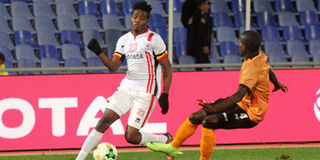Cranes must defy history

Midfield lynchpin. Karisa (R) provided Derrick Nsibambi’s assist during the Uganda-Zambia encounter. PHOTO BY FUFA MEDIA
What you need to know:
- What Cranes require now is two victories against a high-flying Namibia, who beat Ivory Coast with a stoppage time Charles Hambira header, and a wounded Ivory Coast. Uganda have never played Namibia before in international football but the southern Africans will line up with what is essentially their full senior team considering that their strongest national team is home-based.
- There was an injury scare when Mohammed Shaban limped out of training on Monday but he is expected to have fully recovered for tonight’s match. Sebastien has told the players to replicate their opening half performance against Zambia and bury the chances that come their way.
CHAN 2018 GROUP B TABLE
P W D L F A Pts
Zambia 1 1 0 0 3 1 3
Namibia 1 1 0 0 1 0 3
Ivory Coast 1 0 0 1 0 1 0
Uganda 1 0 0 1 1 3 0
From the body language in training at the Sport Marrakech complex, it is apparent the Zambia defeat has been washed out of the system.
The players and technical team have moved on, and all the concentration is on Namibia who are geographical neighbours of Group B table leaders Zambia.
“We still have six more points to play for,” says skipper Bernard Muwanga.
“We feel that Namibia and Ivory Coast are games we shall win to qualify to the next round,” the soft-spoken defender told Daily Monitor after training yesterday.
For Cranes, there is no alternative but to think positive.
The scale of the task going into the Namibia game is daunting.
It is not so much about Namibia’s quality like the weight of history against Sebastian Desabre’s team.
In 10 Chan matches through four editions, Uganda have managed only one victory – the 2-1 result against Burkina Faso in South Africa achieved through goals by Yunus Ssentamu.
Chan has never been a happy hunting ground for Cranes and Sebastien will have to ring changes that will prolong Uganda’s interest in the competition.
The national team has suffered six defeats through the four editions and played out three stalemates.
What Cranes require now is two victories against a high-flying Namibia, who beat Ivory Coast with a stoppage time Charles Hambira header, and a wounded Ivory Coast. Uganda have never played Namibia before in international football but the southern Africans will line up with what is essentially their full senior team considering that their strongest national team is home-based.
There was an injury scare when Mohammed Shaban limped out of training on Monday but he is expected to have fully recovered for tonight’s match. Sebastien has told the players to replicate their opening half performance against Zambia and bury the chances that come their way.
Watson, Mawanda in Tangier
Imagine being in Morocco for football-related duties but watching Uganda Cranes only on television! Fufa CEO Edgar Watson and former Fufa general secretary Haruna Mawanda are both in Morocco but not Marrakech. They are 575kms away in the coastal city of Tangier where they are doing Caf duty.
It is a six-hour bus journey between the two cities and seeing the winter conditions here, there is no point in them having to connection to Marrakech after all. Even with the advanced transport means here (there is the option of air and fast trains too), Watson and Mawanda will stay in Tangier to do what brought them, Caf work.
Donkeys a common sight
It is not uncommon to see a pair of donkeys being ridden usually by the elderly on the beautifully constructed Moroccan roads. They share the roads with brand new SUVs in an all-too common sight in Marrakech. As a tourist in Morocco, you are directly or indirectly benefitting from the exceptionally hard worked donkey whether you realise it or not. If you’re planning a little mountain trekking then you will probably have a donkey to help carry the bags. If you have small children then they will love the idea of a donkey ride (especially if they’re scared of the camels).
Hospitable locals
Moroccans are generally very receptive people. In the Maghreb region, they are perhaps the most hospitable. For a country that reaps a lot from a booming tourism industry, it is not surprising that they treat all visitors to their country very well. Ask any local for help and he or she will be willing to go the extra mile to make sure that your request or inquiry has been addressed satisfactorily. You can’t help but feel at peace in this country, the harsh weather notwithstanding.




